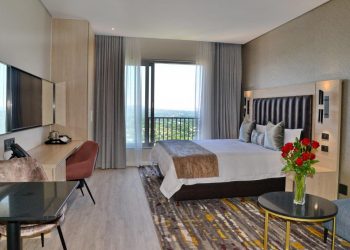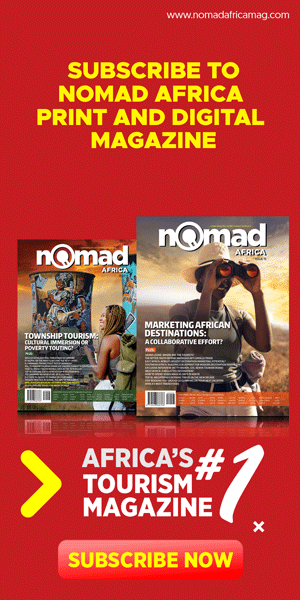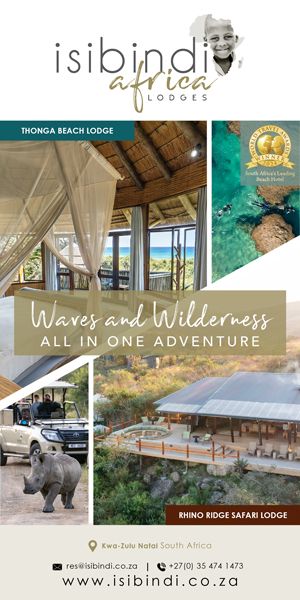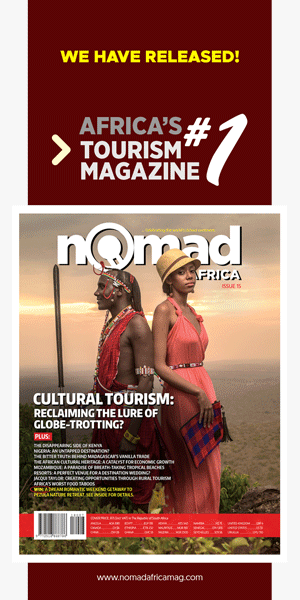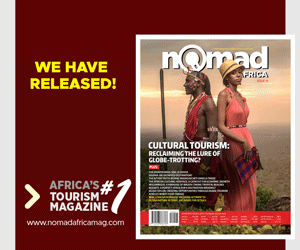Fair Frade Tourism (FTT) is a non-profit organisation promoting best-practice responsible tourism in Africa that offers to grow awareness about responsible tourism in Africa and assist tourism businesses to operate more sustainably through membership and certification programmes. Nomad Africa Magazine’s
Bruce Germaine interviewed Manuel Bollmann on how FTT functions, issues around
Ecotourism and the ever current issue of Greenwashing.
Q: “Going Green, Eco-friendly, Ecotourism” – are terms that multinational corporations and tourism stakeholders use liberally. Please give us an update why this is an internationally accepted practice and fashionable, particularly within the tourism industry.
A: The use of the word green to signify conservation can of course be looked up. GREEN as the new marketing colour of choice started mostly in the food sector, where products were designed / branded in different shades of ‘green’ to signify to consumers that what they are going to consume is both healthy for the planet, and more importantly, for their own health. Now there is green tourism, green cosmetics, green finance and even green (or clean) coal. Essentially, organic product marketing managed to break a glass ceiling about a decade ago (at least in Europe and America), and I would say that other sectors took that cue from other industries to target consumer segments that already seemed to understand that language.
We did a similar thing with Fair Trade (in Tourism), where there was also already comparatively significant recognition amongst consumers for this language. None of the above though has anything to do with credibility of the true green (if taken as sustainable) content of the marketing package or at least it varies widely in application. FTT took all criteria used by the credible Fair Trade International label and adapted them from the agricultural sector to tourism, bar some exceptions that were not translatable into the tourism (or service) industry as such. I think the colour “green” has simply developed its own dynamic in the market place, both for consumers and marketing agencies.
In the 70s, tourism was sometimes called the “white” industry (as opposed to the black smoke coming out of chimneys in other industries) or simply the “industry without chimneys”. Today, we know that tourism is a major contributor to climate change, with airline emissions adding at least 5% to global GHG and large hotels being the most energy-intensive publicly used buildings after hospitals and malls. So no more white, enter green. Same difference.
Q: In Africa, which countries have a regulatory body that upholds, enforces and maintains environmentally friendly guidelines/laws/regulations ?
A: This obviously goes far beyond the tourism sector. This varies widely across administrations, paper-policy or enforced policy – legal frameworks that are or are not actively pursued by competent government agencies. Rwanda is often touted as being very strong on enforcing its laws, including in conservation, but it is also using a lot of force that some say is undemocratic. The point is, having good laws is nice, being able to enforce them nicer, but doing so not by force, but within democratic principles gets the cherry. I am in no position to grade governments on these criteria. I am just a tourism guy. But yes, through our engagements, we could see that certain governments like Namibia, Seychelles, Botswana or Morocco do know what they are talking about and go beyond issuing legal policies on paper and engaging in heavy workshop catering for years bringing no results.
Ideally, and that has been the history of the environmental movement (and many others) – civil society organisations are usually the ones that break through with public recognition and are able to provide recommendations and solutions, before governments for lack of want or capacity are able to address them. But that is not an African phenomenon – look at the VW scandal!
Q: How does Africa rate on an international scale when it comes to greenwashing?
A: I can only say from anecdotal evidence that I think Africa is certainly not the worst. Certain countries in Asia surely are more “advanced” in greenwashing across all kinds of industries, from what I have seen. You will find the craziest list of toxins on “green” Korean cosmetic products, for example. You will also find World Natural Heritage Sites in Vietnam, where you are reminded not to litter the trails with greenish signboards all over the place, but the park is surrounded by wildlife restaurants freely choosing from a menu of endangered species that call the “protected” area their home. In terms of the most progressive countries in sustainable tourism, I would say Botswana tops it in Africa. Switzerland and the Netherlands are very strong in Europe. India would be my guess for a pick closer to the top of the greenwashing list. But a lot of labels are international, so it is not that easy to say, who is at fault here – the greenwashing marketing/’certification’ outfit or those product owners that (maybe well-intentionally) make use of their services.
Q: How does FTT work in terms of becoming a member and what is FTT’s role and function within the context of being environmentally friendly?
A: We engage directly with product owners that we think might be interested and would fit well into our portfolio. We get a lot of information from tour operators that we work with, who point out some of the high-potentials in their own package portfolios to us and often introduce us directly. We also go to trade shows and other events, where we can engage with the trade directly. Once a business is interested, they can sign up with us on our homepage. Thereafter our Business Development Support Desk contacts them and walks them through the next steps. Once enough information is available to us, we assign a consultant to visit the business and start the BDS process. After that process has succeeded, a business is market ready for audit and the audit is scheduled. After a successful audit, and corrective actions that may have to be done, certification is awarded.
Our focus has always been on people. So a lot of our environmental criteria also require people engagement. Hence, it is not sufficient to have an environmental management plan, a business also has to make sure that its staff have ownership of it and understand it.
In the audit process, staff are interviewed on a sample basis to see if they understand why they are required to implement certain environmental measures, such as limiting use of cleaning materials and water conservation. It is also important that a business’s impact on the environment does not also threaten communities living around it, for example, by polluting rivers or dangerous waste dumping.
Q: List the most frequent greenwashing methods that tourism stakeholders are most guilty of.
A: What makes me personally most suspicious is the common phrase “Sustainability is about everything we do”.
Even if this is used by many legitimately sustainable business people in the industry as well, the phrase is almost a tautology. Very typical phenomenon are also symbolic once-off activities for “the community”, especially those that include photo-opportunities involving children. As FTT we would say that is all nice, but if you do not live it inside of your company and for your staff, then don’t brag about the crumbs you drop off your table for the community. A lot of places have for decades also resorted to messages to their guests in the bathrooms as their only measure (“don’t use too much water, reuse the towel”, etc.).
But I prefer to mention positive examples rather than negative ones. If you want to know if a business actually takes this seriously, look at The Vineyard group (Oude Werf in Stellenbosch: Townhouse Hotel, The Vineyard in Cape Town – all certified by us). They removed all the bathplugs from their rooms, politely telling guests that if they really feel they need to bath (e.g. their toddler or for medical reasons), that they should please report to reception and ask for a plug.
We are talking about the luxury segment here, so that is impressive in terms of guest communication. Some stuff is also much simpler. Coffee Shack uses only 1-ply toilet paper (also because they have a septic tank), telling their backpackers with a smile: “It’s one ply in the Transkei !” But it isn’t only the industry that does dubious things. I was at a large donor conference last year that was about opening up protected area borders between countries so that wildlife can migrate freely (and ultimately tourists too). Elephants are their flagship and the project logo even has two elephants on it. When it came to the excursion programme, I opted for the “community tourism” site visit. Little did I know that we would stop at an elephant back-riding place. Our two full coach tour busses then offloaded onto six of these creatures and everyone except me and some other guy rode them around in a circle within one hour or so. Then we moved on to see the community’s own cheetah and lion petting place. You can say about the relevance of wildlife-petting for conservation what you want, but a handsomely funded conservation project promoting free wildlife migration in our day and age, that then prides itself on displaying captive wildlife interaction of the worst kind to its delegates, is certainly ironic.
Q: How is FTT promoting fair practice in terms of responsible tourism across the continent of Africa ?
A: For the first ten years of its existence, FTT has mostly focused on South Africa. After receiving a sizeable 5-year grant in 2012, FTT leveraged the relationships it already had on the continent through some previous network activities and initiated the Sustainable Tourism Certification Alliance Africa (The Alliance).
This multi-stakeholder dialogue platform was key to strengthen relationships between key actors from government and NGOs across Southern and East Africa, although some Central and North African players were also partly involved. Through annual conference and membership meetings, and activities throughout the years, trust was built between FTT and most key players. With eight of them FTT has developed closer partnerships to collaborate, but numerous more were engaged closely on a bilateral basis as well.
Organisations from countries that owned their own certification scheme, Seychelles, Tanzania, Kenya, Botswana, Namibia, Egypt were approached by means of standard comparison. An independent auditing firm compared each criterion in our standard with the respective other standard, scrutinised the certification process and then came back with recommendations. This mostly involved that these other standards needed to add criteria in order to balance their standard out with ours.
Often, this referred to social inclusion aspects, where many of them (coming from the “ecotourism” school of thought) were not that strong yet. This way we harmonised the standards of five neighbouring schemes with our own mandatory criteria: Botswana Ecotourism (gov-run), EcoAwards Namibia (NGO-run), Ecotourism Kenya (NGO-run), Responsible Tourism Tanzania (NGO-run) and Seychelles Sustainable Tourism Label (gov-run).
We were not able to complete the process with the Green Star Hotel Programme in Egypt, however, because the standard comparison revealed too many (but largely expected) gaps in their workplace-policy related criteria, which was unfeasible to change at the time (try to introduce minimum wage to an empty 1000-bed resort…good luck!).
In Madagascar and Mozambique, there were no comparable standards to mutually recognise with. There we engaged with the Mozambican NTA INATUR and a provincial tourism association (Inhambane) and GoTo Madagascar (TO Association) to promote the introduction of direct FTT certification in their respective countries.
By reaching out to our partners in these countries, we have doubled our portfolio of certified businesses that can be promoted as part of Fair Trade Holiday itineraries by tour operators to over 200 within three years.
Our South African portfolio has also grown, which we are now trying to push further in the lower end of the industry, by making our services more accessible to SMEs. Essentially, instead of being “hit” with coaching and introduction of all our 250 criteria, such businesses can become members and introduce these criteria in parcelled form one toolkit at a time.
Crucially, we need external funding for this as small businesses usually do not have the funds to pay for a consultant to work for them. We are still looking for donors to support us with this from next year onwards (we are clinching a donor contract in support of these trainings soon).”
Q: Does FTT identify businesses (hotels, game lodges, tour operators, e.t.c) that are not committed to responsible tourism and just “greenwashing”, why and how?
A: Essentially, any business can sign up and register with us. There are a few initial questions we ask, to save the completely delusional ones their and our time. But then, it is the BDS and audit process, which scrutinises any claim made by the business in terms of sustainability and beyond. We actually go through their books and policies with them and point out deficiencies. Once most of them have been addressed, they have to go through an audit by an independent service provider, who scrutinises all these criteria based on their documentation, staff interviews, site inspection, and so on. Afterwards, there are usually a number of corrective actions a business has to address (only one so far did not have to – one in Cape Town, very recently).
Once these corrective actions are addressed, and only then, certification is awarded and they are included in our marketing services and industry engagements. Members, who are not yet certified, are included in some engagements, but are not actively promoted to the trade or public and also do not get to use our certification brand.
What we do not do is blacklisting or negative advocacy, i.e. calling out the bad guys. We’d rather turn the not-so-good ones around.
Q: Tell us what FTT has achieved in the last 5 years up to now ?
A: ”Most successes were related to the mentioned expansion across the subcontinent and as far as Kenya. We also shouldered the biggest donor project that our organisation ever implemented during the same time, which was not always easy. We also engaged, much more than in previous years, with the public and wider industry on child protection – trained over 500 individuals on the subject and were widely received nationally and internationally.”
Q: Looking into the future, what are your biggest priorities and ultimate aims and vision in terms of responsible tourism for the next 5 years?
A: The biggest priority for FTT is to become as independent from institutional donors as possible and become financially sustainable in its own right. Our vision is still to make our brand established across the industry and our neighbouring countries, so that it will be able to ultimately penetrate into the mainstream – hopefully within the next 5 years.
Q: Although tourists may be genuinely seeking to spend their money at “environmentally friendly/green” resorts, how and why are tourists being bamboozled by stakeholders by purporting to be green/environmentally friendly, when numerous tourist businesses are actually not ?
A: I can’t really say how big the problem of consumer disinformation actually is in this space. But environmental awareness in the public domain, and especially in the media has reached a level I think, where you can’t simply ignore how “green” your business is especially when you are selling nature-based product like game drives.
Some big brands also have built up reputation armour around them with “the green thing”. Especially larger corporates are very vulnerable to public scrutiny, especially when it comes to seemingly innocent leisure activities like tourism. So if there is a bad story on TV on some Robinson Club’s drainage system bursting on a sunny beach day or an overtired shuttle driver having an accident, the TUI’s of this world can say: Sorry that happened (TUI Group is the largest leisure, travel and tourism company in the world).
But we are committed to improving and take this very seriously, we actually have a programme in place to avoid this, look what great green stuff we’re doing otherwise…. Essentially, it is reputation risk management. Other “fraudsters” (while not calling TUI one) might just be trying to make it in a very competitive industry and feel like the green leaf they hold up makes them stand out in the crowd. For most of our own clients at FTT, receiving our label is not primarily because they want to use it in their marketing. Most are genuinely committed and are seeking outside recognition for their own (often long-term) efforts to crown their accomplishments.
Q: What can tourists do to be more vigilant and critical if they are wanting to align themselves with environmentally friendly/green vacation places ?
A: Very clear: talk to the staff. It is nice to engage with people anyway and why not talk to them? You don’t have to become a private snoop doing that. It can be quite casual and fun. I once asked a receptionist what the ecolabel is about that was displayed on the wall behind him. He said that he thinks “it has something to do with the garden…”
 “As FTT we would say that is all nice, but if you do not live it inside of your company and for your staff, then don’t brag about the crumbs you drop off your table for the community. A lot of places have for decades also resorted to messages to their guests in the bathrooms as their only measure (“don’t use too much water, reuse the towel”, etc.).” – Manuel Bollmann
“As FTT we would say that is all nice, but if you do not live it inside of your company and for your staff, then don’t brag about the crumbs you drop off your table for the community. A lot of places have for decades also resorted to messages to their guests in the bathrooms as their only measure (“don’t use too much water, reuse the towel”, etc.).” – Manuel Bollmann
ABOUT THE MANUEL BOLLMANN
Manuel is a GIZ Integrated Expert at Fair Trade Tourism” (GIZ is Germany’s biggest government donor agency). He stumbled into the sustainable tourism field ten years ago, when he was researching on the Wild Coast for his MA in cultural anthropology. Manuel believes sustainable tourism development can be a good way to support and sustain livelihoods of otherwise struggling families.
This article was written by Bruce Germaine.





